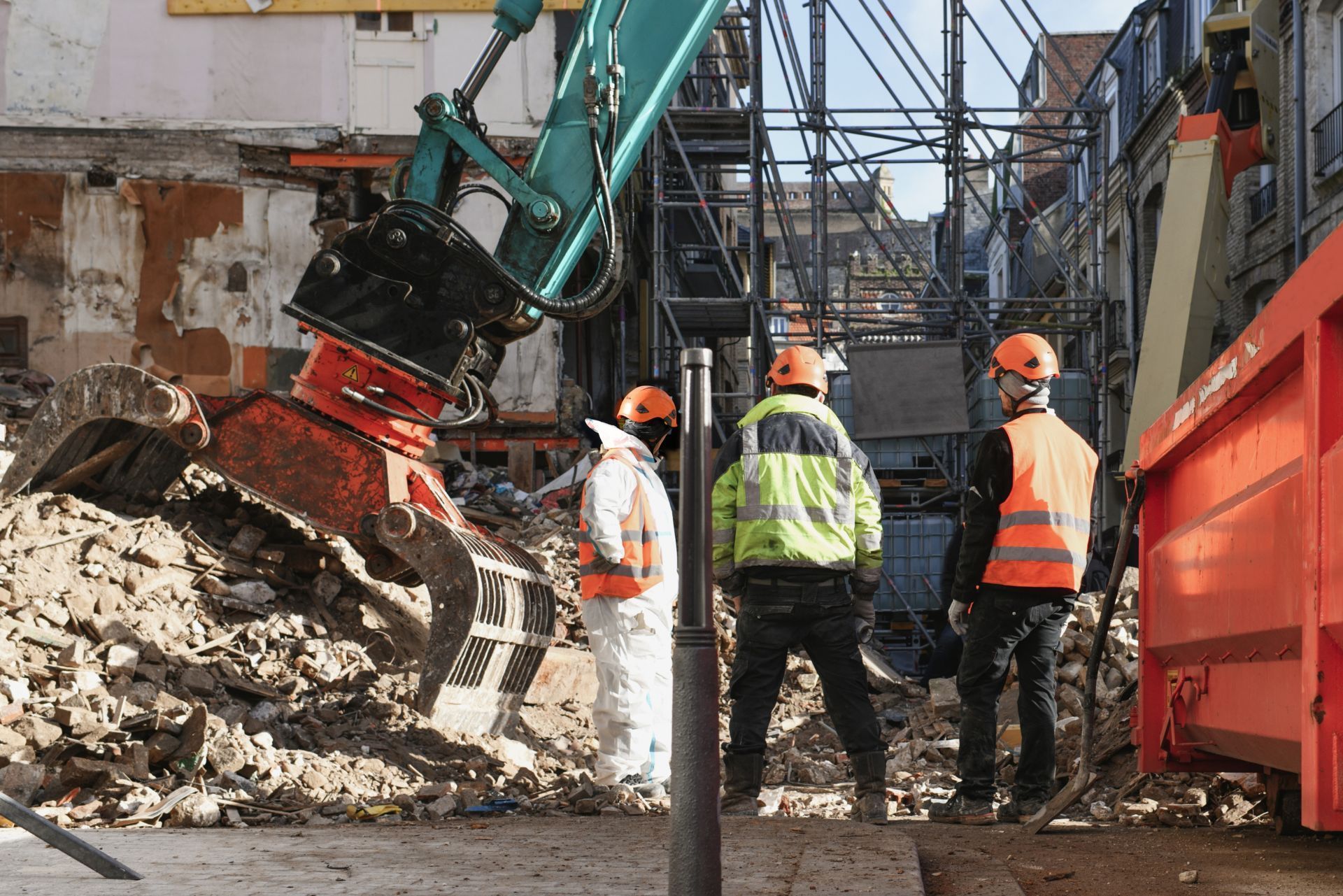
Top 3 Recommended Policies
Demolition contractors play a crucial role in the construction industry, tasked with safely dismantling structures to make way for new developments. However, this line of work comes with its own set of risks and challenges. To protect their businesses and ensure compliance with state regulations, demolition contractors in Connecticut must secure the right insurance coverage. This article delves into the essential aspects of demolition contractors insurance in Connecticut, providing valuable insights for those in the industry.
Understanding Demolition Contractors Insurance
Demolition contractors insurance is a specialized type of coverage designed to protect businesses engaged in demolition activities. It encompasses various policies that address the unique risks associated with the demolition process, including property damage, bodily injury, and equipment loss. Understanding the different types of insurance available is crucial for contractors to ensure they are adequately protected.
Types of Insurance Coverage
Several types of insurance coverage are essential for demolition contractors. Each type serves a specific purpose and addresses different risks involved in demolition work.
- general liability insurance: This is a fundamental policy that protects contractors from claims of bodily injury or property damage occurring on the job site. It covers legal fees, medical expenses, and settlements arising from accidents.
- workers' compensation insurance: This coverage is mandatory in Connecticut for businesses with employees. It provides benefits to workers who suffer job-related injuries or illnesses, covering medical expenses and lost wages.
- Commercial Auto Insurance: Since demolition contractors often use vehicles to transport equipment and personnel, commercial auto insurance is necessary. It covers accidents involving company vehicles and protects against liability claims.
Additional Coverage Options
In addition to the standard policies, demolition contractors may consider additional coverage options to further protect their businesses:
- Pollution Liability Insurance: Given the potential for hazardous materials during demolition, this coverage protects against claims related to environmental damage caused by pollutants.
- Equipment Insurance: This policy covers the loss or damage of heavy machinery and tools used in demolition, ensuring that contractors can quickly replace or repair essential equipment.
- Umbrella Insurance: This provides additional liability coverage beyond the limits of existing policies, offering an extra layer of protection against large claims.
Moreover, demolition contractors should also be aware of the importance of site-specific insurance. Each demolition project may present unique challenges and risks, depending on the location, type of structure, and surrounding environment. For instance, a project involving the demolition of an old industrial site may require additional coverage due to the potential presence of hazardous materials like asbestos or lead. By conducting thorough risk assessments before starting any project, contractors can tailor their insurance policies to meet the specific needs of each job, ensuring comprehensive protection.
Furthermore, staying compliant with local regulations is essential for demolition contractors. Many municipalities have specific insurance requirements that must be met before a contractor can obtain the necessary permits to begin demolition work. This can include proof of liability coverage, workers' compensation, and even environmental insurance. By understanding and adhering to these regulations, contractors not only protect their businesses but also foster trust with clients and stakeholders, demonstrating their commitment to safety and professionalism in the demolition industry.

Why Insurance is Essential for Demolition Contractors
Insurance is not just a legal requirement; it is a vital component of risk management for demolition contractors. The demolition process involves numerous hazards, from falling debris to exposure to toxic substances. Without adequate insurance coverage, contractors could face significant financial losses in the event of an accident or lawsuit.
Legal Requirements in Connecticut
Connecticut has specific legal requirements for demolition contractors regarding insurance. The state mandates that all contractors carry workers' compensation insurance if they have employees. Additionally, general liability insurance is highly recommended to protect against potential lawsuits.
Contractors should also be aware of local regulations that may impose additional insurance requirements, particularly when working on public projects or in certain municipalities. Understanding these legal obligations is crucial to avoid penalties and ensure compliance. Moreover, contractors must stay updated on any changes to these regulations, as non-compliance can lead to costly fines and damage to their reputation.
Protecting Your Business and Assets
Insurance not only protects against legal liabilities but also safeguards a contractor's business assets. In the event of a significant loss, such as a workplace accident or equipment theft, having the right insurance can mean the difference between recovery and bankruptcy.
Furthermore, clients often require proof of insurance before awarding contracts. A contractor with comprehensive insurance coverage demonstrates professionalism and reliability, making them more competitive in the bidding process. This can be particularly important in a competitive market where clients are looking for assurance that their project will be handled safely and responsibly. Additionally, having robust insurance coverage can enhance a contractor's reputation, as it signals to potential clients that they prioritize safety and risk management, which can lead to more referrals and repeat business.
In addition to the standard insurance policies, contractors may also consider specialized coverage options such as environmental liability insurance. This type of insurance is particularly relevant for demolition projects that involve hazardous materials, as it provides protection against claims related to pollution or contamination. With the increasing focus on environmental regulations, having this coverage can not only protect the contractor but also reassure clients that their project will be managed with environmental responsibility in mind.
Choosing the Right Insurance Provider
Selecting the right insurance provider is a critical decision for demolition contractors. The right insurer can offer tailored coverage options, competitive rates, and excellent customer service. Here are some factors to consider when choosing an insurance provider:
Experience in the Industry
Look for insurance companies that have experience working with demolition contractors. They will better understand the specific risks and challenges associated with the industry, allowing them to provide more relevant coverage options. An insurer with a solid track record in the demolition sector can also offer insights into compliance with local regulations and safety standards, which can be invaluable for your business. Additionally, they may have established relationships with industry professionals, which can lead to better service and support.
Policy Customization
Every demolition business is unique, and insurance needs can vary widely. A good insurance provider should offer customizable policies that allow contractors to select coverage options that best suit their business operations and risk profile. This flexibility is essential, as it enables contractors to adjust their coverage as their business grows or changes, ensuring they are always adequately protected. Furthermore, consider whether the insurer provides options for bundling different types of coverage, such as general liability, workers' compensation, and equipment insurance, which can lead to cost savings and simplified management of your policies.
Claims Process and Support
A reliable insurance provider should have a straightforward claims process and offer support when needed. Research reviews and testimonials to gauge the experiences of other contractors with the insurer's claims handling and customer service. A responsive claims team can make a significant difference during stressful situations, such as accidents or property damage. It's also beneficial to inquire about the average turnaround time for claims and whether the provider offers online tools or resources to help streamline the process. Additionally, consider the availability of dedicated account managers who can assist you with any questions or concerns, ensuring you have a reliable point of contact throughout your policy term.
Cost Factors for Demolition Contractors Insurance
The cost of insurance for demolition contractors can vary significantly based on several factors. Understanding these factors can help contractors budget effectively and find the best coverage options.
Business Size and Scope
The size of the demolition business and the scope of work will influence insurance costs. Larger companies with more employees and equipment may face higher premiums due to increased risk exposure. Additionally, a larger workforce often means a greater likelihood of workplace accidents, which can further elevate insurance costs. Conversely, smaller contractors may benefit from lower premiums, but they must ensure they have adequate coverage to protect against potential liabilities that could arise from their projects.
Type of Work Performed
The nature of the demolition work also plays a role in determining insurance costs. High-risk projects, such as those involving hazardous materials or complex structures, may require additional coverage, leading to higher premiums. For instance, demolishing a building that contains asbestos necessitates specialized insurance due to the health risks involved. Furthermore, contractors who engage in environmentally sensitive demolitions may need to invest in additional liability coverage to address potential environmental impacts, which can also affect overall insurance costs.
Claims History
A contractor's claims history can impact insurance rates. Businesses with a history of frequent claims may face higher premiums, while those with a clean record may qualify for discounts or lower rates. Insurers often evaluate not just the number of claims but also the severity of those claims. A single significant claim can lead to increased scrutiny and higher costs, while a series of minor claims might not have the same impact. This emphasizes the importance of maintaining safety protocols and investing in training programs to minimize risks and protect the company’s financial interests.
Location and Regulatory Environment
The geographical location of the demolition business can also play a crucial role in determining insurance costs. Areas with stringent regulations and higher costs of living may see increased premiums due to the higher operational risks and potential liabilities associated with local laws. For example, urban areas with dense populations may present unique challenges and hazards that require more comprehensive coverage. Additionally, contractors must be aware of local regulations regarding demolition practices, as non-compliance can lead to fines and increased insurance costs.
Experience and Reputation
The experience level of the contractor and the reputation of the business can significantly influence insurance premiums. Established contractors with a proven track record of safety and successful project completion may find themselves in a better position to negotiate lower rates. Insurers often reward businesses that demonstrate a commitment to safety and quality workmanship, as these factors contribute to reduced risk. Newer contractors, on the other hand, may face higher premiums until they build a solid reputation in the industry. Investing in certifications and safety training can enhance a contractor's profile, potentially leading to more favorable insurance terms.

Common Risks Faced by Demolition Contractors
Demolition work involves various risks that can lead to accidents and liabilities. Understanding these risks is essential for contractors to implement effective safety measures and obtain the necessary insurance coverage.
Workplace Accidents
Accidents can occur on job sites due to falling debris, equipment malfunctions, or worker negligence. These incidents can result in serious injuries or fatalities, making it crucial for contractors to have adequate liability and workers' compensation insurance. Furthermore, implementing rigorous training programs for workers can significantly reduce the likelihood of accidents. Regular safety drills and the use of personal protective equipment (PPE) are vital components of a comprehensive safety strategy that not only protects workers but also enhances overall operational efficiency.
Environmental Hazards
Demolition projects may involve exposure to hazardous materials, such as asbestos or lead. Failure to manage these risks can lead to significant legal liabilities and environmental damage, underscoring the importance of pollution liability insurance. Contractors must conduct thorough site assessments to identify potential hazards before beginning work. This proactive approach not only safeguards the health of workers and the surrounding community but also helps in complying with environmental regulations, thereby avoiding costly fines and legal repercussions. Additionally, employing specialized teams for hazardous material removal can further mitigate risks associated with environmental contamination.
Property Damage
Demolition work can inadvertently cause damage to neighboring properties. This risk necessitates robust general liability insurance to cover potential claims from affected property owners. To minimize the chances of such incidents, contractors should engage in detailed planning and communication with adjacent property owners. Establishing clear boundaries and utilizing protective barriers can help prevent accidental damage during demolition. Moreover, conducting pre-demolition surveys can document the condition of nearby structures, providing valuable evidence in case of disputes. By taking these precautionary measures, contractors can not only protect their financial interests but also foster positive relationships within the community.
Tips for Reducing Insurance Costs
While insurance is essential, contractors can take steps to reduce their premiums without compromising coverage. Here are some strategies to consider:
Implementing Safety Protocols
Establishing and adhering to strict safety protocols can help minimize workplace accidents. A strong safety record can lead to lower insurance premiums, as insurers view businesses with effective safety measures as lower risk. This can include regular safety training sessions for employees, conducting safety audits, and ensuring that all equipment is well-maintained and up to code. Additionally, fostering a culture of safety within the workplace encourages employees to take ownership of their own safety and that of their colleagues, which can further reduce the likelihood of accidents.
Bundle Insurance Policies
Many insurance providers offer discounts for bundling multiple policies. By combining general liability, workers' compensation, and commercial auto insurance, contractors can often save money while ensuring comprehensive coverage. It’s also worth exploring additional options like property insurance or professional liability coverage, which can provide further savings when bundled. Moreover, some insurers may offer loyalty discounts for long-term customers, making it beneficial to maintain a good relationship with a single provider for all insurance needs.
Regularly Review Coverage Needs
As a business grows or changes, so do its insurance needs. Regularly reviewing and updating coverage can help contractors avoid overpaying for unnecessary policies or underinsuring their operations. This process should involve assessing any new risks that may have emerged due to changes in the business model, such as taking on larger projects or expanding into new markets. Engaging with an insurance advisor can provide valuable insights into the most relevant coverage options and help identify potential gaps in protection, ensuring that the business remains adequately safeguarded without incurring excessive costs.
Conclusion
In the competitive field of demolition contracting, having the right insurance coverage is not just a legal requirement; it is a critical component of a successful business strategy. By understanding the various types of insurance available, the risks involved, and how to choose the right provider, demolition contractors in Connecticut can protect their businesses and ensure long-term success.
Investing in comprehensive insurance coverage not only safeguards against potential liabilities but also enhances a contractor's reputation and competitiveness in the industry. As the demolition landscape continues to evolve, staying informed about insurance options and best practices will remain essential for contractors aiming to thrive in this dynamic field.
Contact Us
Phone
Locations
Connecticut Location
703 Hebron Ave., 3rd Floor, Glastonbury, CT 06033
North Carolina Location
436 East 36th St., Charlotte, NC 28205


